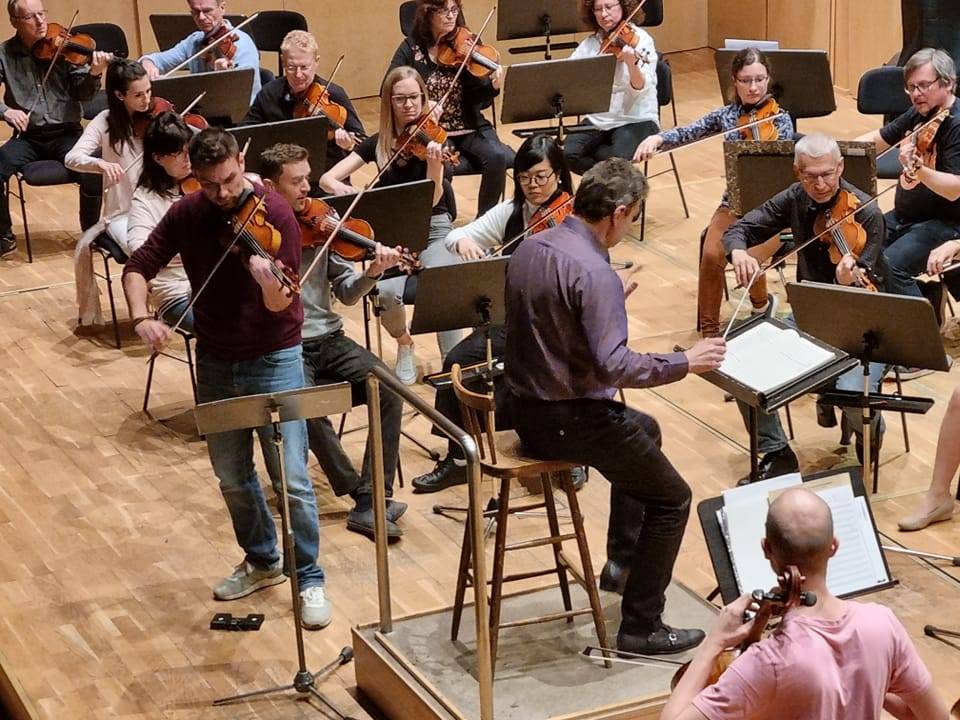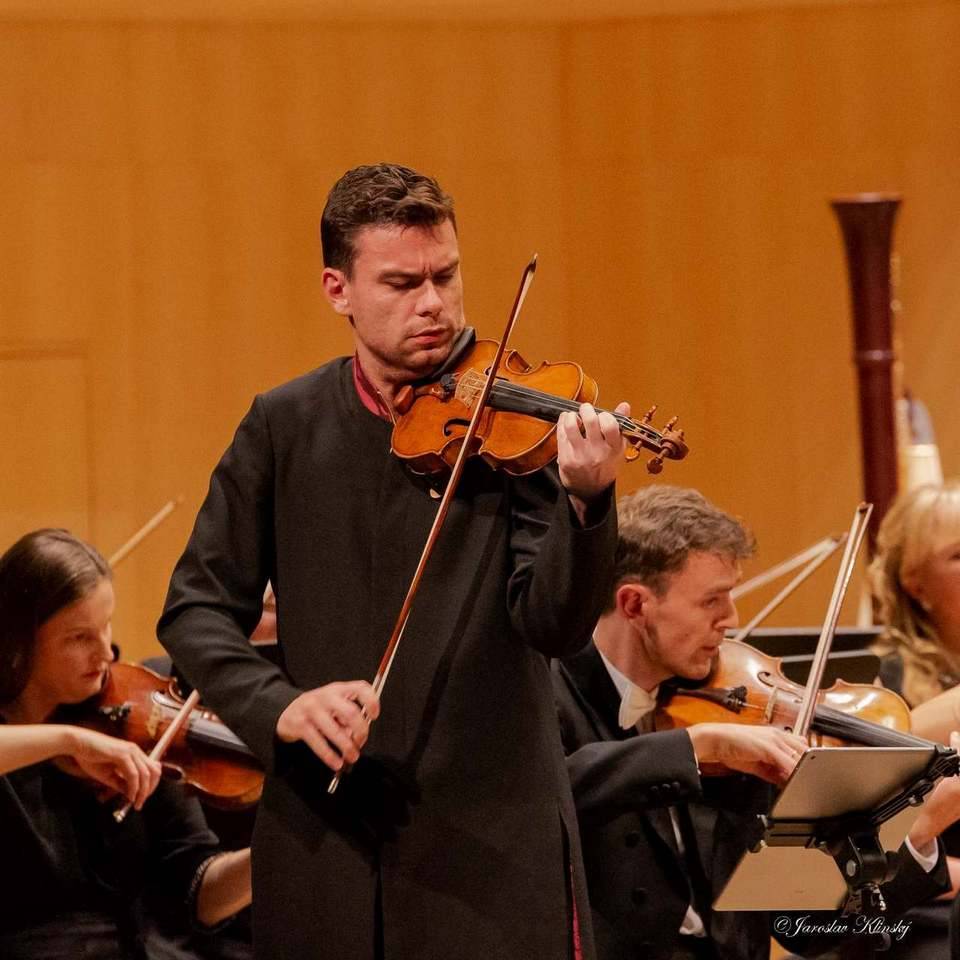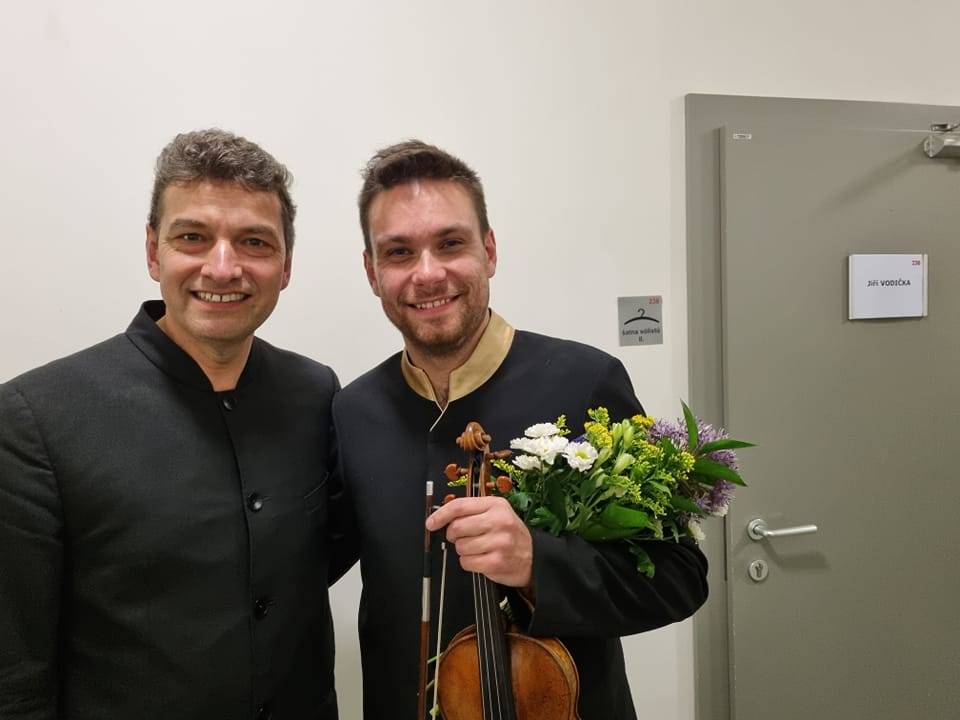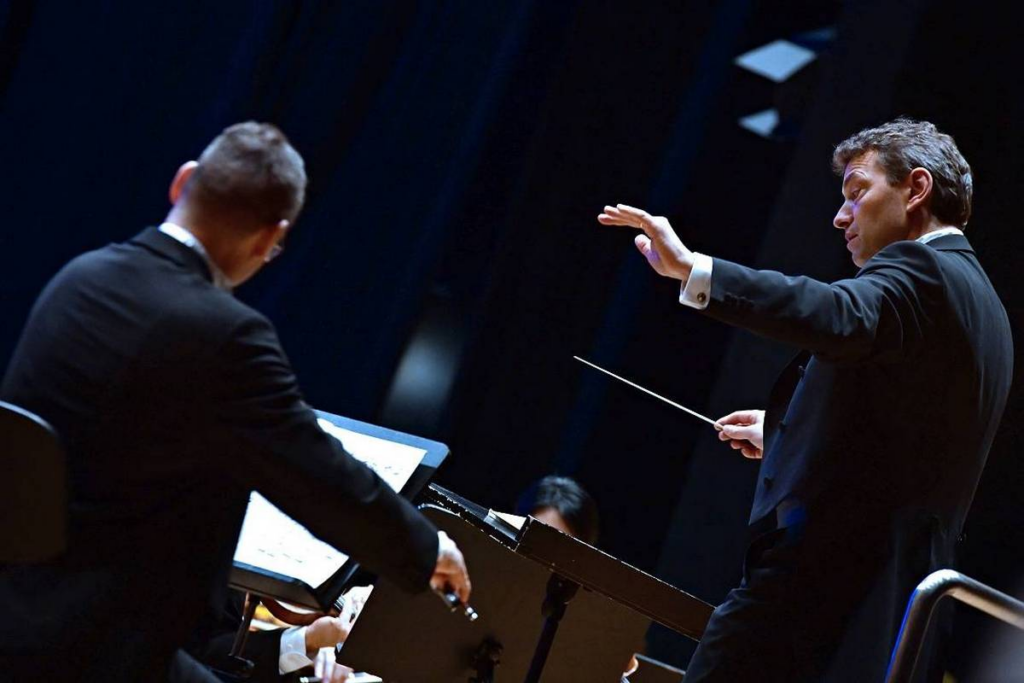“It’s incredible how well Zehnder gets along with the musicians from Hradec Králové. You can feel this on stage in the gestures, the mutual glances, the expression of concentration and the exchange of smiles.”
writes Roman Marčák in his concert review of 30 April 2023 in the Czech online magazine “klasikaplus” about the subscription concert of the Hradec Králové Philharmonic Orchestra on 27 April 2023. The concert was conducted by principal conductor Kaspar Zehnder.
English translation of the concert review of 30 April 2023 in the online magazine “klasikaplus”.
On the Waves of Romanticism with the Hradec Králové Philharmonic and Jiří Vodička
Author: Roman Marčák
“Conductor Kaspar Zehnder seems to know exactly what he is doing; he wants to give everyone space to play, and in doing so he manages to keep the ensemble enchantingly cohesive.”
“Vodicka playfully evokes the given melody, plays with its nuances, intoxicates himself with the cuteness and then brilliantly masters the cadenza of the first movement.”
“The orchestra develops Wagner’s endless melody in a way as if asking for tickets to Bayreuth…”
The Hradec Králové Philharmonic Orchestra has prepared for its subscription audience a concert of its great symphonic cycle with well-known works of the Romantic period. Music by German and Austrian composers such as Carl Maria von Weber, Felix Mendelssohn-Bartholdy, Franz Schubert and Richard Wagner will be heard in the hall. Tickets for the evening, when the concertmaster of the Czech Philharmonic Orchestra, Jiří Vodička, performed as soloist and the orchestra’s chief conductor, Kaspar Zehnder, conducted the concert, were in great demand in the city; it was almost impossible to get a seat at the last minute. The Hradec Králové Philharmonic Orchestra confirmed its current excellent form and once again gave the audience a great musical experience.
Some time ago we wrote in this space that the arrival of Swiss conductor Kaspar Zehnder completed the process for the orchestra at the confluence of the Elbe and Orlice rivers, in which it is gradually evolving from a purely regional ensemble into a full participant in the Czech music scene. It is incredible how well Zehnder gets along with the players from Hradec Králové. You can feel it on stage in the gestures, the mutual glances, the expressions of concentration and the exchange of smiles. However, we don’t have access to the rehearsals, where this symbiosis is certainly still being refined. In any case, in concert everything works as it should.

What is the best way to create a romantic atmosphere? Weber’s prelude to The Sorcerer never disappoints. As soon as the horns sound at the beginning, we are in another world. But the horns must not only be mysterious, they must also display a high degree of self-confidence – any misstep would be unforgivable. In Hradec, this was achieved with flying colours from the very first moment; the members of the group did not waver. Gradually other instrumental groups joined in, the atmosphere condensed and then relaxed again. All under the careful direction of the conductor, who this time chose a perhaps surprisingly calm tempo. But Kaspar Zehnder seems to know what he is doing; he wants to give everyone space to play, and in doing so he succeeds in keeping the ensemble in an enchanting cohesion. The audience is enchanted.
“Playfully, the conductor conjures up the given melody,
plays with its nuances,
intoxicating himself with its sweetness,
then bravely tackles the cadenza of the first movement.”
Then comes the elegant gentleman, the virtuoso Jiří Vodička. Felix Mendelssohn-Bartholdy’s Violin Concerto in E minor, op. 64 follows. The soloist does not play from memory; sometimes, when he is not communicating with the conductor, his eyes rest on the monitor with the notes. But that doesn’t bother anyone, because the sound carried through the hall is more important. And that in turn has a magical effect on the audience. Playfully, the conductor conjures up the given melody, plays with its nuances, intoxicates himself with its sweetness, and then boldly tackles the cadenza of the first movement. Thanks to the interweaving of the individual movements, but also thanks to the sensitively handled alternation of the sovereign soloist with the orchestra, which was reliable in every respect, the work flowed into the expected experience even before the intermission. The performance we attended clearly shows that even a less virtuosic part can be an asset when the violin is given space to develop the melody gently and when the emphasis is on suggestive instrumentation.

“Das Orchester unter seiner Leitung spielt wie ein Schweizer Uhrwerk”
Franz Schubert’s Symphony in B minor D 759 “Unfinished” is also based on melodies and their repetitions in both movements. It is the orchestra’s task to captivate concertgoers even without contrasts and striking motifs, which the composer more or less dispensed with in this case. Kaspar Zehnder chooses a deliberate tempo, but this time it seems to be emotionally more brisk. The orchestra under his direction plays like Swiss clockwork; it is a pleasure to listen to the cellos, for example.
I still know at least two members of the group from my student days – they were students of Josef Krečmer at the Pardubice Conservatory at the time, but East Bohemian musical life is above the traditional rivalry between the two regional cities.
“The orchestra unfolds Wagner’s infinite melody,
as if asking for tickets to Bayreuth…”
And of course Richard Wagner at the end. Tristan and Isolde, WWV 90, Overture and Isolde’s Death by Love. A concert piece created by the unique combination of the overture and the ending of an iconic full-length stage work. High Romanticism at its most expressive and lush. Now show yourselves, fighting cocks! Kaspar Zehnder pauses, the house stands still. Something grand, mystical, magical, breathtaking. Including the famous “Tristan” chord. The orchestra unfolds Wagner’s infinite melody as if asking for tickets to Bayreuth… No, let’s stay down to earth, let’s not exaggerate. But the performance is truly magnificent, and it is hard to escape its effect. The audience is enchanted one last time, then, still in a kind of trance, receives a generous, sincere applause.

Kaspar Zehnder, conductor and Jiří Vodička, violin
Photos: Jaroslav Klinský a Patrick Marek, online magazine “klasikaplus”
